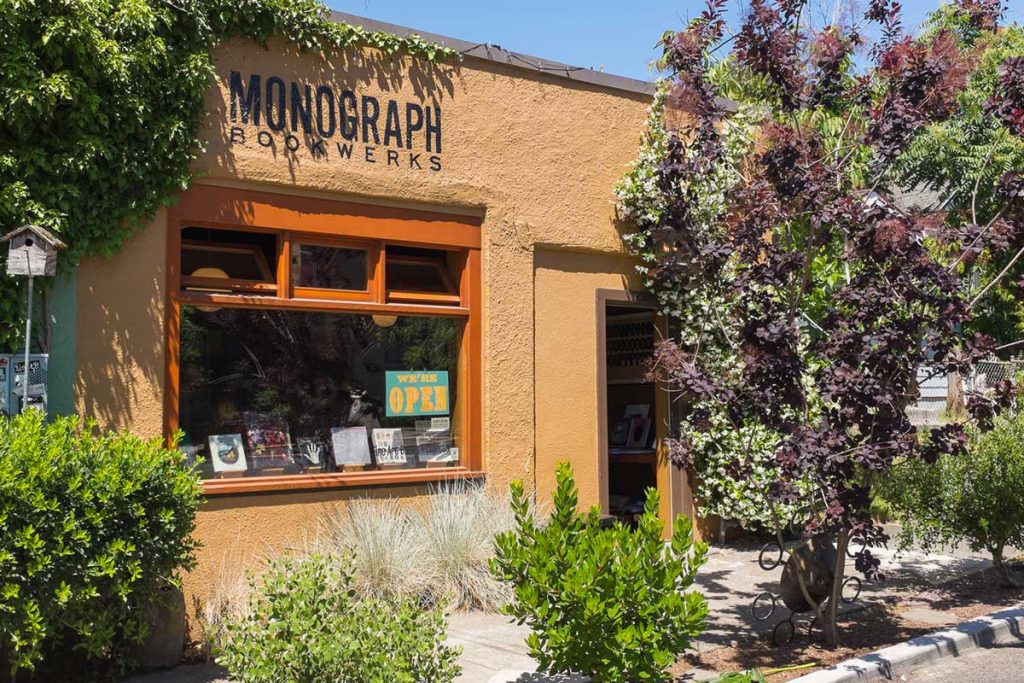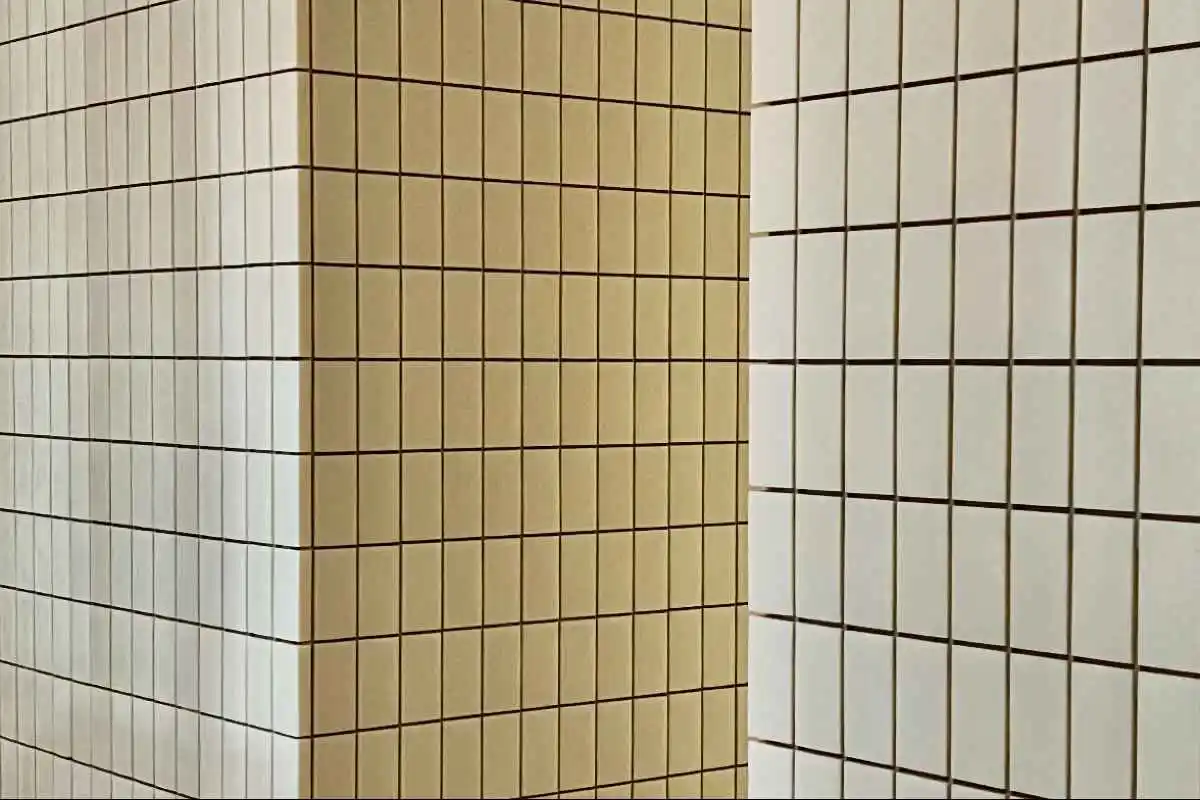John Brodie and Blair Saxon-Hill opened Monograph Bookwerks in 2010 for people to study, explore and purchase books about art, politics and theory
John Brodie and Blair Saxon-Hill
Being active in Portland’s art scene, John Brodie and Blair Saxon-Hill wanted to create a space to search and develop ideas. The duo shared an involvement in the arts. In 2010, founders decided to turn their passion for books into a business. «We used to go shopping for books together and they influenced our practice. We were using them or images from them in our work, and we were making artists’ books».
For Mr. Brodie and Ms. Saxon-Hill, author of site-specific installations, artist books, sculptures, photographs, paintings and prints, the bookstore functions as a collection of images. With the exception of the sections on theory, criticism and writings about art, the bookstore’s material is visual, and acts as a source for the development of the artists’ collage works.
Monograph Bookwerks – A combination of art and business
They built its vision and character, which Mr. Brodie portrays as «a combination of art and business». The latter half of the bookstore’s name, werks, alludes to the idea of craft. Featuring a selection of books, ephemera, artworks and objects, Monograph Bookwerks sources its material from around the world, representing publishers and small-press editions from the locality.
The store carries studio pottery and mid-century ceramics, vintage art and office supplies, prints, textiles, paintings and works on paper. Its object collection is populated by vintage, found, one-of-a-kind items, first-hand and used.
As Mr. Brodie explains, «At the store you can find stimulus to build your vision into creation. It is evolving, like a living-thing: it is not static or about history. It is about what we are going to change – ideas and culture – to move forward».
The philosophy of the bookstore – there is no ‘clunker’
«It means there is no filler. You could pick any book in the bookstore and it is going to be of interest. As we sell items, it is not a museum, but it could be referred to as one. The items we amassed during our ten years of activity add to the store What we built is a collection. That is how customers refer to it. But I don’t acquire items like a collector would – I don’t buy items for the store», says Mr. Brodie.
In their selection process, the founders gravitate toward pieces that people would not find with ease. «We have a selection of approachable, inspiring pieces priced at five or six dollars». Inside the store, books are arranged according to sections such as art, architecture, graphic design, fashion, photography, artist biographies, countercultures, theory and art criticism, which are ordered alphabetically; the rest is organized in open areas.
«It is about collecting items»: Monograph Bookwerks about display and aesthetics
Ms. Saxon-Hill is in charge of directing the store’s display and aesthetics, while Mr. Brodie handles the practical details. From an artistic standpoint, their interest resides in discovering art and artists that have yet to be recognized. They learn as they collect.
«In the Sixties and Seventies, the scene in New York was on the move. We come across a piece that is of importance, but do not know what it is. When we find material from that era, it is a task to find information because it could have lasted for a minute».
«There are references to scenes, movements or people, but the item could have been the sole material published by that group or organization, so it remains obscure. It is about collecting items to learn about them, and to present them to someone who might find them of use for their practice and studies».
Ever expanding archive research
Before the birth of the project, Mr. Brodie worked for twenty years as concert promoter in Portland and Seattle, and a decade as manager of Portland-based band Pink Martini.
With a background in French literature and philosophy as well as twenty-five years of experience as a painter, he developed the store’s collection with a focus on visual and contemporary art from the 1900s, concentrating on the era of conceptual-art, a time when «artists started thinking outside the box – a turning point for the Twentieth century and for us», he says.
Instead of focusing on fine-art, form and style, Mr. Brodie centers his research on this era. «An artist I tend to go back to is Dieter Roth. Towards the end of his life, when he was making the Xerox books, the scope of what he was doing was inspiring to see». The idea of the archive – which is present in Roth’s practice – recurs in the bookstore’s selection and in the artworks that inspire its founders. Mr. Brodie defines Monograph Bookwerks as «an ever-expanding archive».
In regard to literary influences, James Joyce’s Ulysses has been an influence on Mr. Brodie’s path. «You could read it ten times and not understand it. That is why I think of it as a work of art, and why I’m drawn to it». What interests Brodie about books is that they are vessels for ideas.
Monograph Bookwerks’ selection revolves around the Sixties and Seventies, a period of worldwide political and cultural transformations. Crossovers between movements were seen in the Bay Area in California, Mr. Brodie recollects. This period influenced cultural and political life from then on, and its role has become «topical» in the last ten years. «Art is political, as life is», he tells us.
Brodie’s passion for ephemera is connected to the way it changes over time
Born as a distribution of information, items such as flyers and leaflets have disappeared, and as a category, they have evolved. To Brodie, such pieces are artifacts, in spite of being produced in the recent past. His enthusiasm resonates with that of his customer base. He has observed that in younger generations there seems to be a fascination for histories they didn’t live through.
«What’s curious is that adolescents are keen on criticism, theory, and theoretical writings about painting and sculpture, including ephemera and radical movements from the ear we cover. It is a time period that is accessible. Understood as a historical event, it is happening again. Political brochures, flyers, periodicals, newspapers – physically, it is in the customer’s hands. They perceive them as historical documents».
Operating between that which is antique and the art book world, the project seeks to reach audiences by introducing customers to – and helping them discover – art and books from past decades. «Portland is becoming a city for the youth. Its art scene used to be in a bubble, and everyone knew each other. Now it Is fractured, made of groups. This is because of the influence of social media».
The advent of art book fairs such as Printed Matter, which started to gain visibility in the 2000s
It brought together a community of booksellers and publishers. This came as a surprise to Brodie, who didn’t expect to become part of that world at the time of the project’s inception. As a specialty bookstore, Monograph Bookwerks has an affiliation to that dimension, but in terms of community, it maintains a connection to the regional net of booksellers, bookstores and organizations.
The store sells to museums, Brodie remarks. «Booksellers are on the front end of discovering. That is why institutions rely on them to find material that could support their exhibitions. We are part of that community».
As the restrictions on dining came into effect in 2020, Alberta Street, where Monograph Bookwerks is located, has emptied. That is how JPEG Bookstore came to be: an «analog» website, as Brodie defines it, whose structure mirrors the sensation of browsing through the bookstore, and where there is no cart system.
«It is an accessible version of the store’s collection. I tried to remove the aspects that characterize a website, as I think they get in the way of looking at the books. It does not play by the rules of internet commerce: people get confused because you can’t add a book to your cart. The manner in which we shop online is getting standardized».
In the words of the owner, «standardization affects how society thinks. We need to watch out for this, as it has impacts on culture, society, ideas, and thinking. It is one of the problems inherent in digitization and global communication».
Monograph Bookwerks
5005 NE 27th Ave, Portland, Oregon.




















